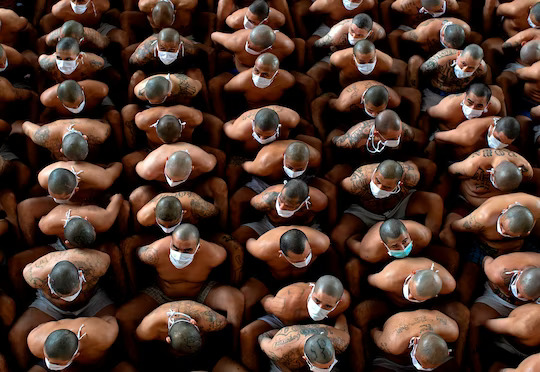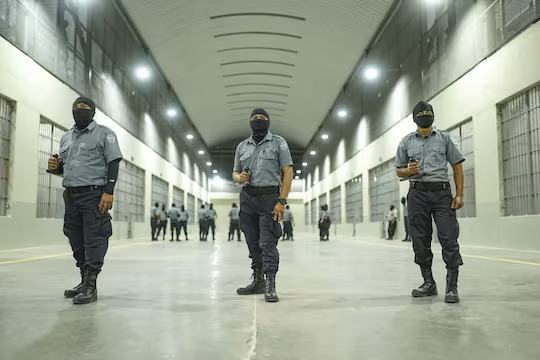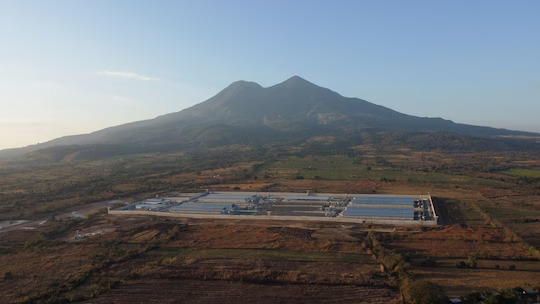“A common-sense project,” Bukele called it.
The Scale of El Salvador’s New Prison Is Difficult to Comprehend
LATIN AMERICA AND THE CARIBBEAN, 6 Mar 2023
León Krauze | The Washington Post - TRANSCEND Media Service

Members of the “Mara 18” and “MS-13” gangs are seen in custody at a maximum security prison in Izalco, Sonsonate, El Salvador, on Sept. 4, 2020. (Yuri Cortez/AFP via Getty Images)
26 Feb 2023 – Earlier this month, Nayib Bukele, president of El Salvador, unveiled his latest infrastructure project: a massive, “first-world” jail that could well become the largest penitentiary in the world, with an alleged capacity to hold 40,000 inmates. This weekend, he announced the transfer of the first 2,000 prisoners to the new facility.
The reality is that the scale of the project defies common sense — and easy comprehension. And the social implications of the endeavor are no less striking. The citizens of El Salvador have tacitly accepted Bukele’s unprecedented crackdown on crime, and, for the time anyway, are ignoring its broader ramifications.
The unveiling of the prison came in typical Bukelian fashion. He took over the country’s airwaves to share a 35-minute video of himself touring the facilities (it was soon posted on his popular Twitter feed, the presidency’s de facto press office). He can be seen arriving at the jail in a caravan of black SUVs. “Welcome to the Center for the Confinement of Terrorism, a key part in our battle against the gangs,” Osiris Luna Meza, director of El Salvador’s penitentiary system, said.
Ayer inauguramos el Centro de Confinamiento del Terrorismo…
Una gigantesca obra realizada en tan solo 7 meses, y que además es una pieza fundamental para ganar por completo la guerra contra pandillas.https://t.co/TSCkfl41EY
— Nayib Bukele (@nayibbukele) February 1, 2023
Bukele is then shown X-ray machines, surveillance towers and a fully staffed security perimeter. A “riot intervention squad,” armed to the teeth, salutes him. The tour then goes to the cells, meant to hold groups of “terrorists,” and the extreme solitary confinement area, where inmates will be kept completely in the dark — a widely condemned practice.
“They won’t see any daylight, Mr. President,” Luna Meza, whom the U.S. government has placed on a list of officials suspected of corruption in El Salvador, proudly told Bukele.
Spanning about 410 acres in an isolated region of El Salvador, the jail is the latest example of Bukele’s punitive state. And it is slated to become the largest, and most overcrowded, prison in the world.
The only images available come from the government itself. Since only a handful of foreign journalists have been granted access and given carefully arranged tours, claims of the jail’s readiness, layout and operation have not been independently verified.
The project’s finances have also been kept secret. “Contracts were granted capriciously,” reporter Jaime Quintanilla, who covers Bukele’s infrastructure projects, told me. “Nuevas Ideas [Bukele’s party, which controls Congress] passed legislation that allows them to skip basic accountability.” For now, the ministry in charge of such projects has sealed any information on the construction of the country’s jails. There is no official information as to which companies were granted the likely lucrative contracts to build it, although two of Bukele’s preferred contractors were apparently favored. “No one knows how it was all financed,” journalist Óscar Martínez, who runs the independent newspaper El Faro, told me. “If, in terms of security, this is similar to a dictatorship, in terms of public spending, this is already a dictatorship.”
The prison is no white elephant, however. It is a necessity born of Bukele’s policies. Since March of last year, his government has been prosecuting a war on the country’s infamous gangs. To do so, Bukele declared a state of emergency, which has since seemingly become permanent.
At least 60,000 Salvadorans have been imprisoned as a result of the crackdown, including hundreds of minors, often in what a recent joint report by Human Rights Watch and Cristosal calls “indiscriminate raids.” The report paints a chilling portrait of authorities run amok, arresting Salvadorans with “no apparent connections to gangs’ abusive activity,” sometimes acting merely on “appearance or social background.” As of November, 90 detainees had died in custody, according to the government’s own numbers.
Even before the crackdown, El Salvador had one of the highest incarceration rates per capita in the world. After the crackdown, the country might extend its lead in this grim statistic.
______________________________________________
Tags: Central America, Crime, El Salvador, Justice, Latin America Caribbean, Prisons, Social conflict
DISCLAIMER: The statements, views and opinions expressed in pieces republished here are solely those of the authors and do not necessarily represent those of TMS. In accordance with title 17 U.S.C. section 107, this material is distributed without profit to those who have expressed a prior interest in receiving the included information for research and educational purposes. TMS has no affiliation whatsoever with the originator of this article nor is TMS endorsed or sponsored by the originator. “GO TO ORIGINAL” links are provided as a convenience to our readers and allow for verification of authenticity. However, as originating pages are often updated by their originating host sites, the versions posted may not match the versions our readers view when clicking the “GO TO ORIGINAL” links. This site contains copyrighted material the use of which has not always been specifically authorized by the copyright owner. We are making such material available in our efforts to advance understanding of environmental, political, human rights, economic, democracy, scientific, and social justice issues, etc. We believe this constitutes a ‘fair use’ of any such copyrighted material as provided for in section 107 of the US Copyright Law. In accordance with Title 17 U.S.C. Section 107, the material on this site is distributed without profit to those who have expressed a prior interest in receiving the included information for research and educational purposes. For more information go to: http://www.law.cornell.edu/uscode/17/107.shtml. If you wish to use copyrighted material from this site for purposes of your own that go beyond ‘fair use’, you must obtain permission from the copyright owner.
One Response to “The Scale of El Salvador’s New Prison Is Difficult to Comprehend”
Read more
Click here to go to the current weekly digest or pick another article:
LATIN AMERICA AND THE CARIBBEAN:



A huge prison system reminiscent of gulags or concentration camps is alarming, but its impetus needs to be considered. In the shadow of the horrendous homicide rate in El Salvador, a clear picture emerges of deadly criminal gangs. These gangs are themselves made up of thousands of foot soldiers with command structures, claiming territory, collecting revenues, perpetrating drug and human trafficking and declaring wars. Coercive criminal cartels claiming dominion are committing treason in every sense.
In 2015, the murder rate in El Salvador peaked at a whopping 103 per 100,000. Falling from a horrendous 50 in 2018, it was still extreme at 36 in 2019, when Bukele began the crackdown and roundup of gangsters with the government’s Territorial Control Plan. By 2022, it has brought the homicide rate down to 7.8 and will be reduced further, to and estimated 2.4 by year’s end. The price of this reduction is the cost of the incarceration of the huge number of criminal gang perpetrators.
With a history of coups and civil war, El Salvador was weary of the violence. To American ideals, Bukele’s steps may seem dictatorial, but conventions enjoyed by a peaceable society implode under the weight of reality when a nation faces the murder of one in every thousand of its citizens as experienced by El Salvador in 2015.